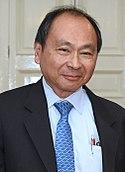Francis Fukuyama Quote
We are taking the time to consider the Hungarian case for a simple reason: to show that constitutional limits on a central government’s power do not by themselves necessarily produce political accountability. The freedom sought by the Hungarian noble class was the freedom to exploit their own peasants more thoroughly, and the absence of a strong central state allowed them to do just that. Everyone understands the Chinese form of tyranny, one perpetrated by a centralized dictatorship. But tyranny can result from decentralized oligarchic domination as well. True freedom tends to emerge in the interstices of a balance of power among a society’s elite actors, something that Hungary never succeeded in achieving.
Francis Fukuyama
We are taking the time to consider the Hungarian case for a simple reason: to show that constitutional limits on a central government’s power do not by themselves necessarily produce political accountability. The freedom sought by the Hungarian noble class was the freedom to exploit their own peasants more thoroughly, and the absence of a strong central state allowed them to do just that. Everyone understands the Chinese form of tyranny, one perpetrated by a centralized dictatorship. But tyranny can result from decentralized oligarchic domination as well. True freedom tends to emerge in the interstices of a balance of power among a society’s elite actors, something that Hungary never succeeded in achieving.
Related Quotes
About Francis Fukuyama
Francis Yoshihiro Fukuyama (; born October 27, 1952) is an American political scientist, political economist, international relations scholar, and writer.
Fukuyama is best known for his book The End of History and the Last Man (1992), which argues that the worldwide spread of liberal democracies and free-market capitalism of the West and its lifestyle may signal the end point of humanity's sociocultural evolution and political struggle and become the final form of human government, an assessment met with numerous and substantial criticisms. In his subsequent book Trust: Social Virtues and Creation of Prosperity (1995), he modified his earlier position to acknowledge that culture cannot be cleanly separated from economics. Fukuyama is also associated with the rise of the neoconservative movement, from which he has since distanced himself.
Fukuyama has been a senior fellow at the Freeman Spogli Institute for International Studies since July 2010 and the Mosbacher Director of the Center on Democracy, Development and the Rule of Law at Stanford University. In August 2019, he was named director of the Ford Dorsey Master's in International Policy at Stanford.
Before that, he served as a professor and director of the International Development program at the School of Advanced International Studies of Johns Hopkins University. Previously, he was Omer L. and Nancy Hirst Professor of Public Policy at the School of Public Policy at George Mason University.
He is a council member of the International Forum for Democratic Studies founded by the National Endowment for Democracy and was a member of the Political Science Department of the RAND Corporation. He is also one of the 25 leading figures on the Information and Democracy Commission launched by Reporters Without Borders. In 2024 he received the Riggs Award for Lifetime Achievement in International and Comparative Public Administration.
Fukuyama is best known for his book The End of History and the Last Man (1992), which argues that the worldwide spread of liberal democracies and free-market capitalism of the West and its lifestyle may signal the end point of humanity's sociocultural evolution and political struggle and become the final form of human government, an assessment met with numerous and substantial criticisms. In his subsequent book Trust: Social Virtues and Creation of Prosperity (1995), he modified his earlier position to acknowledge that culture cannot be cleanly separated from economics. Fukuyama is also associated with the rise of the neoconservative movement, from which he has since distanced himself.
Fukuyama has been a senior fellow at the Freeman Spogli Institute for International Studies since July 2010 and the Mosbacher Director of the Center on Democracy, Development and the Rule of Law at Stanford University. In August 2019, he was named director of the Ford Dorsey Master's in International Policy at Stanford.
Before that, he served as a professor and director of the International Development program at the School of Advanced International Studies of Johns Hopkins University. Previously, he was Omer L. and Nancy Hirst Professor of Public Policy at the School of Public Policy at George Mason University.
He is a council member of the International Forum for Democratic Studies founded by the National Endowment for Democracy and was a member of the Political Science Department of the RAND Corporation. He is also one of the 25 leading figures on the Information and Democracy Commission launched by Reporters Without Borders. In 2024 he received the Riggs Award for Lifetime Achievement in International and Comparative Public Administration.
